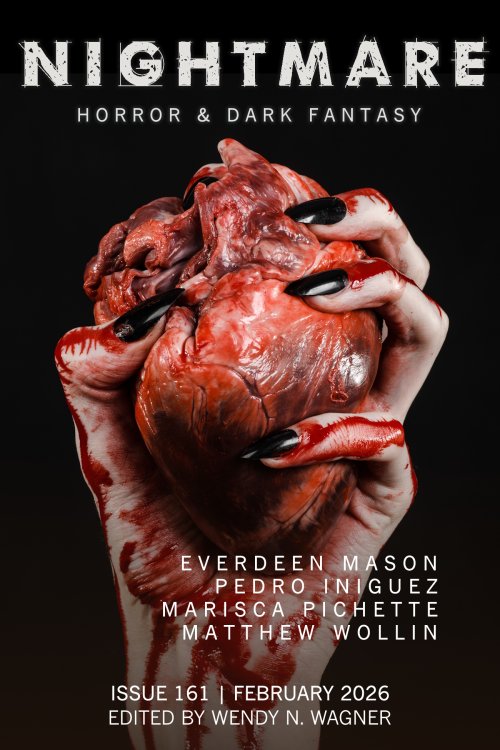“Glory Hole” is a horrific, although incredibly intimate, look into the ways in which we punish ourselves in ways we think we deserve. What was your inspiration for this story? What was the writing process like, and was it any different from the ways you’ve written other stories?
I wrote “Glory Hole” shortly after suffering a serious injury, during a period of life where I was on a lot of pain killers. I think that drug-addled mindset comes across in the story, in some of the more surrealistic elements and in the moral ambiguity of it all. Usually, I have a very clear picture of what I want to say with a story. But here, I just kind of let it come out of me. It’s a very short piece and not much happens in terms of action. But, still, I think it admits several contradictory interpretations. And I’m honestly not sure which one I find more compelling.
Obviously, “Glory Hole” is a story about someone being punished for their transgressions. But it’s also about our tendency to eroticize shame, humiliation, transgression, and the act of punishment itself. The piece is definitely influenced by George Bataille’s Eroticism, which deals a lot with the boundaries between the sacred and the profane, both of which I think are on display in this piece.
It’s also important to remember that “Glory Hole” is told from the perspective of queer characters. These are people who have been raised to believe that their very existence is sinful, that they should be punished for being who they are. It can be difficult to listen to a lifetime of that sort of messaging without subconsciously internalizing some of it. These are also characters who are trying to find their path in life, trying to decide which societal norms are important to maintain in their queer relationships, and which ones should be cast aside. This is why, for example, the story plays with norms surrounding monogamy in the way that it does, presenting one situation where a simple hug might constitute cheating despite the fact that, in a different context, these characters clearly don’t see anything transgressive about oral sex outside of the primary relationship. These are people who are in the process of defining for themselves what “transgression” means after having rejected social conventions surrounding that word.
Finally, it’s also worth noting that there’s a BDSM element to the scene that’s being enacted, so there’s something performative about what we’re watching. And the story is very much playing with that implied ambiguity. After all, if a BDSM scene is going well then the “transgression” that’s being punished is probably either inconsequential or else purely imaginary. And the “punishment” that’s being meted out is probably actually a reward. There’s also another layer of ambiguity in the final alien ovipositor scene, which some readers might take as a literal horror element, while others might read as a symbolic representation of something happening in the characters’ collective erotic imaginations.
There’s a quote in the beginning, when Bruce is talking about divination rituals in China, in which they “sought divine wisdom in the way things shatter.” What wisdom do you think comes from something like that? How do you think the narrator would interpret their own shattering?
There’s a lot one could say about how moments of extreme sensation or emotion (both good and bad) can reveal things we might never have otherwise known about ourselves; Clive Barker, for example, has gotten a lot of mileage out of toying with such ideas. But, for me, I tend to think about this shattered scapula metaphor in terms of personal identity. I think there’s something very profound about seeing yourself fracture, about getting to a point in your life where, finally, you realize that you’re not the person you had once believed you were (which often coincides with the person society expected you to be). There’s something almost spiritual about these moments where we start to see the fault lines forming in our worldview and we’re left trying to decode what it all means and how we want to understand ourselves and our position in the world going forward.
The narrator, at the end of the story, says that they deserve this, this treatment they are receiving. What constitutes this sort of self-punishment?
I think this particular moment really hinges on how literally one wishes to interpret the events being depicted. The big open question, for me, is whether the narrator is actually being tortured to death for these utterly low-stakes sins from his past. Or, alternatively, perhaps we’re witnessing something more like a surrealistic depiction of some extreme role-play scenario. (Remember that the setup for the story is that this is all the narrator’s fantasy come true . . .) Under one interpretation, the narrator is a tragic figure who’s had his spirit broken by a hideous abuser. Under the other interpretation, the narrator is actually enjoying himself. And, of course, the two interpretations are not mutually exclusive, because it can start off as the one thing and then become the other. And if that’s the case, then the question becomes: at which point does that transition occur?
Do you have any other projects you’re working on that you can talk about?
Yes! I’m putting the finishing touches on a book called All is Vanity: Still Life for these Dark Times, which will probably be published by the time this piece goes live. On the one hand, it’s an art book, compiling more than 250 of my original creepy still life compositions. At the same time, there’s a nonfiction aspect to this book, where each category of still life arrangement is accompanied by an essay explaining the symbolism and historical context. It’s a big project which I think develops a comprehensive theory of still life art, drawing from scripture, absurdist philosophy, pop culture, and the history of the Dutch Golden Age. I’m really proud of this book and I hope people will check it out!







